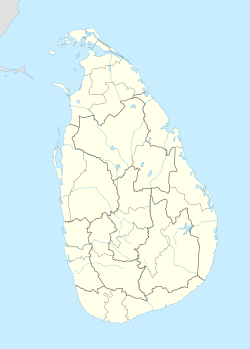Dodanduwa
Dodanduwa | |
|---|---|
Town | |
 Forest monks's chapter hall (to Island Hermitage) | |
| Coordinates: 6°5′48″N 80°8′44″E / 6.09667°N 80.14556°E | |
| Country | Sri Lanka |
| Province | Southern Province |
| District | Galle District |
| Population (2001) | |
| • Total | 6,200 |
| Time zone | UTC+5:30 (Sri Lanka Standard Time) |
Dodanduwa is a small coastal town situated in Galle District, Southern Province of Sri Lanka.
Dodanduwa is known for a Buddhist Island Hermitage where monks follow the strict Sri Lankan Forest Tradition (meditation and loneliness).
The town is located approximately 14 kilometres (9 mi) north of Galle and 140 kilometres (87 mi) south of Colombo. Prior to the Second World War, Dodanduwa was known as the commercial centre for Salt Fish or Jaadi.[1]
Transport
[edit]Road
[edit]Located on the A2 highway (Colombo-Galle-Hambantota-Wellawaya) a part of the Colombo-Galle road.
Rail
[edit]Dodanduwa railway station is the 45th station on the Coastal Line and is located 101.5 km (63.1 mi) from Colombo.[2][3] The station, constructed in 1900, has one platform and all non-express trains running on the Coastal Line stop at the station.[4]
Education
[edit]The Sri Piyaratana School at Dodanduwa is the first Buddhist School in the country, and was inaugurated by Sri Piyaratana Tissa Mahanayake Thero in 1869.[5][6]
Buddhist temples
[edit]- Island Hermitage
- Shailabimbarama Maha Viharaya
- Morakola Gangarama Temple
- Kumarakanda Maha Viharaya[7]
- Rajarama Purana Viharaya
See also
[edit]References
[edit]- ^ Kannangara, Ananda (14 October 2012). "Jadi, Dodanduwa's delicacy". Sunday Observer. Retrieved 28 April 2020.
- ^ "Station Details in Coast Line". Sri Lanka Railways. Retrieved 29 April 2020.
- ^ Perera, G. F. (1925). The Ceylon Railway: The Story of Its Inception and Progress. Ceylon Observer. p. 284.
- ^ "Dodanduwa Station Timetable". TrainTime.lk. Retrieved 29 April 2020.
- ^ Karunadasa, W. M. "First Buddhist school needs public support for survival". Sunday Island. Retrieved 28 April 2020.
- ^ Kariyawasam, A. G. S. (13 October 2004). "Buddha's philosophy of awakening". The Daily News. Retrieved 28 April 2020.
- ^ Wijesinghe, Mahil (6 August 2017). "Kumarakanda Vihara: a Buddhist temple with Dutch influence". Sunday Observer. Retrieved 30 April 2020.
